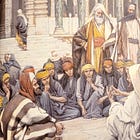How is Satan ‘a murderer’ and ‘the father of lies’?
Anyone who lies and denies the known truth needs to contemplate these words.
Anyone who lies and denies the known truth needs to contemplate these words.
Editor’s Notes
NB: This is Part VI of a series on Christ’s disputes in the Temple. While the previous parts are rich reflections on these disputes, Parts V-VII are dealing directly with the Gospel for Passion Sunday, and can be read without reference to Parts I-IV.
In the previous part, Fr Coleridge explained Our Lord’s words about the slavery of sin, and his response to the Jews’ boast of being the free sons of Abraham, and in no need of liberation.
In this Part, Fr. Coleridge tells us…
How Christ reveals the devil as the true father of those who reject him and seek his death
That all lies, heresies, and hatred of truth originate in the devil, the father of lies
Why Our Lord’s calm response to slander teaches us to endure hatred for the sake of truth.
He shows us that to reject Christ is to embrace the devil’s murderous and lying spirit—and takes us closer and closer to Christ’s definitive, earth-shattering declaration of his own divinity:
“Before Abraham was made, I AM.”
This solemn affirmation of his divinity drives His enemies to fury—
and they take up stones to kill Him.
For more context on this episode, its significance and its place in the Roman Liturgy, see here:
Disputes in the Temple
The Preaching of the Cross, Part I, Chapter XIII
St. John viii. 12-20.
Story of the Gospels, § 93
Burns and Oates, London, 1886
Headings and some line breaks added.
Sung on Passion Sunday
How did the Sanhedrin know Christ would affirm his divinity under oath?
What prevented the Jews from hearing Christ’s words properly?
The devil a murderer and liar
When He spoke to them about their doing the works of their father, by whom He meant the devil, they had understood the words as if they related to ‘fornication.’ It must often happen, that in conversing with unbelievers, or again, with thoroughly worldly people, who have no ideas beyond what is visible and sensual, the ministers of God are unable to find in them any intelligence of a subject-matter which is spiritual and divine. In such cases, the discourse is as much beyond the grasp of the hearer, as when even its language cannot be understood.
However, our Lord proceeded at once to put the matter in very clear words.
‘You are of your father the devil, and the desires of your father you will do.’
This, then, is what He had meant when He said, ‘You do the things that you have seen with your father. You do the works of your father.’ He then gives a twofold characteristic of the devil, and so of his works. He is a murderer, and a liar.
‘He was a murderer from the beginning, and he stood not in the truth, because truth is not in him. When he speaketh a lie, he speaketh of his own, for he is a liar, and the father thereof’
—that is, the father of lying.
Satan’s rebellion against God implied the insane desire of the destruction of God. When he misled the thousands of angels who shared in his revolt, he misled them to their own destruction. When he tempted Eve, his desire was the destruction and murder of the whole human race, and as long as the world lasts, he will be occupied in the work, as far as it is permitted him, of murdering souls by sin and of desiring the destruction of those whom he is not permitted to murder.
It was he who had inspired the Pharisees with their jealousy and hatred of our Lord, and these suggestions of his had ripened into their design actually to take away His life, a design which was ultimately, and at no great distance of time, to be successful. This design proved them to be his children as a murderer.
The father of lying
Again, as to lying. The devil invented the lying thought which led to the revolt of the Angels, and he seduced our first parents, by a deliberate lie, telling them that they should not die. All the myriads of swarms of lies by which mankind had been deceived ever since, as in the false systems of religion and philosophy of paganism, came from him.
And the same is to be said of all the heresies by which the children of the Church have been led astray, as well as of all the false glosses of worldliness, sensuality, and the like, by which men have been persuaded to disobey the law of conscience and of God. For no sin is ever loved and committed except under the lying mask of something good or something allowable, and no falsehood is ever embraced except under the guise of truth. To arrange and put forward these masks and false pretensions is the peculiar work of the devil.
Thus our Lord says of him, first that he ‘stood not in the truth.’ For God had created him with the light of truth, had given him a supremely powerful and noble intelligence, and had strengthened the immense powers of his natural faculties by wonderful aids of grace. Notwithstanding all, he threw away the truth, and chose a lie. Then He says that ‘when he speaketh a lie, he speaketh of his own, for he is a liar, and the father of it.’ The lie is his own child, his own creation, the product of himself alone, which has no origin but in him, and his progeny of lies fills the whole world, not one single falsehood of all having any other progenitor than he.
Two forms of falsehood
Our Lord goes on to show that they are the children of the devil as to lying as well as in their murderous designs. Falsehood may be shown in two ways, by lying assertion, and by resistance and opposition to truth.
‘But if I say the truth, you believe Me not.’
They followed their father the devil, by rejecting the truth when proposed to them by our Lord. He speaks with perfect and Divine knowledge, rather as judging them than as arguing with them.
There were three possible reasons by which their rejection of His doctrine might be accounted for. The preacher might be untruthful or unworthy of credit, the doctrine might be unsound, or the hearers might be obstinate and malevolent. But the messenger of God was His Son, and His authority had been abundantly established, as well as His holiness.
This removes the first alternative, which our Lord touches when He says, ‘Which of you shall convince Me of sin?’ That being removed, it followed that what He asserted was true, yet they did not believe Him. Thus the second alternative, that of the viciousness or unsoundness of the doctrine, was removed also.
There remained, therefore, the third. ‘If I say the truth why do you not believe Me?’ Why, indeed, except that you are yourselves evil. ‘He that is of God heareth the words of God, therefore you hear them not,’ not because I am wicked or my doctrine untrue, but ‘because you are not of God.’
Their abuse of our Lord
They had no answer to make to Him now but mere abuse.
‘The Jews therefore answered and said to Him, Do we not say well, that thou art a Samaritan, and hast a devil?’
It is hardly worth while to inquire what there may have been in our Lord on which these absurd charges were founded. The Samaritans were the most powerful and the most hated of all those whom the Jews looked upon as heretics and perverters of the truth, opponents of the Law and the ancient traditions of their religion, for they differed from the heathen in this, that they professed to worship the God of the Jews and to follow the original law of the Jews.
Thus to call our Lord a Samaritan was to call Him, as we should say, a heretic, as distinguished from an unbeliever. The charge of having a devil may have been a form of the calumny about casting out devils through Beelzebub, or they may have fastened upon His claims to Divine power and honour, or on something in His teaching which they did not understand.
Their dishonour to our Lord
Our Lord, with great calmness and condescension, answered each of these malignant charges. Jesus answered:
‘I have not a devil, but I honour My Father, and you have dishonoured Me.’
They had charged the Incarnate Son of God with being a demoniac, and, if the charge about being a Samaritan is to be understood as has been explained above, with teaching or acting against the honour of the true God. The denial that He is a demoniac meets their second charge, the assertion that He honours His Father meets the other. The word honour1 is the proper word for the honour paid to a father by a son. Our Lord asserts that He pays this honour to His Father in all that He does and says as His Messenger, and then He retorts the charge on them, because the Father’s will is that they should honour Him in His Human Nature as sent by Him. He refers to His own words to them in the former disputation, related in the fifth chapter of this Evangelist, in which He had said that the Father had given all judgment to the Son, that all might honour the Son as they honour the Father, and that ‘He that honoureth not the Son honoureth not the Father Who had sent Him.’2
‘You have dishonoured Me. But I seek not My own honour.’
He did not choose to punish them for their dishonour, for that would have been inconsistent with the whole character of His present mission in the world. ‘There is One that seeketh and judgeth,’ that is, the Father, to Whom My honour is dear, and Who, although He does not at present execute judgment vindictively by way of punishment, still notes silently and places on record the dishonour that is done to Me and the chastisement which it deserves.’
End of Part VI. Having exposed the true lineage of those who deny him and the known truth, Our Lord speaks of eternal life—and is prompted to unveil his divinity to his enemies in a way that drives them to try to kill him.
Disputes in the Temple
How did the Sanhedrin know Christ would affirm his divinity under oath?
What prevented the Jews from hearing Christ’s words properly?
Read Next:
Here’s why you should subscribe to The Father Coleridge Reader and share with others:
Fr Coleridge provides solid explanations of the entirety of the Gospel
His work is full of doctrine and piety, and is highly credible
He gives a clear trajectory of the life of Christ, its drama and all its stages—increasing our appreciation and admiration for the God-Man.
If more Catholics knew about works like Coleridge’s, then other works based on sentimentality and dubious private revelations would be much less attractive.
But sourcing and curating the texts, cleaning up scans, and editing them for online reading is a labour of love, and takes a lot of time.
Will you lend us a hand and hit subscribe?
Follow our projects on Twitter, YouTube and Telegram:
Fair Use Rationale for image above: It is being used for informational and educational purposes; it is readily available on the internet and YouTube; images like it are used by many other sites; it is unsuitable for commercial use.
See St. Matt. xv. 4; xix. 19; St. Mark vii. 10; Ephes. vi. 2
St. John v. 23.




